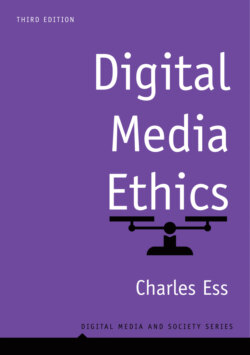Читать книгу Digital Media Ethics - Charles Ess - Страница 20
Is digital media ethics possible? Grounds for hope
ОглавлениеThese challenges are certainly daunting. Indeed, when we first begin to grapple with digital media ethics, especially with a view toward incorporating a range of global perspectives and changing notions of selfhood and responsibility, the tasks before us may seem to be overwhelming and perhaps simply futile. But both our collective experience with earlier technological developments and more recent experience in the domain of information and computing ethics (ICE) suggest that, despite the considerable challenges of developing new ethical frameworks for new technologies, we are nonetheless able to do so. Indeed, this experience provides us with a number of examples of ethical resolutions that “work” both globally (as they involve discerning shared norms and understandings) and locally (as they further involve developing ways of interpreting and applying shared norms in specific cultural contexts – and thereby preserving the distinctive ethical differences that define diverse cultural identities).
As a primary example: the European Union has drawn up and now implemented more rigorous privacy protections than were defined under previous data regulations (GDPR 2016; Berbers et al. 2018). In 2015, the European Data Protection Supervisor (EDPS) established an Ethics Advisory Group, assigned to develop a “new digital ethics” to help guide the specific implementations of the GDPR, including sustaining the rigorous EU privacy protections vis-à-vis the emerging Internet of Things and growing uses of Artificial Intelligence (AI). This new digital ethics, however, turns squarely on two ethical frameworks we have begun to explore here – namely, deontology (roughly, an insistence on human autonomy and thereby basic rights, including the right to privacy) and virtue ethics (briefly, a focus on achieving good lives of flourishing through the development of our best capacities). For example, the EDPS Ethics Advisory Group (EAG) foregrounds the central importance of autonomy and freedom, including as these are grounded in the philosophical work of Immanuel Kant (Burgess et al. 2018, 16). Similarly, both the EAG report and the more philosophical account of the key ethical pillars of a “Good AI Society” (Floridi et al. 2018, 689f.) foreground the central aims of virtue ethics – namely, flourishing, well-being, and good lives (Burgess et al. 2018, 21; Floridi et al. 2018, 690f.). At the same time, these ethical frameworks are (also) applied in a pluralistic fashion. So the EAG asserts that basic norms and values – such as autonomy, dignity, equality, and so on – are both central “to the European project” (Burgess et al. 2018, 16). Indeed, these are claimed to be universal – while recognizing that “these values must be understood and implemented in the social, cultural, political, economic and not least, technological contexts in which the crucial link between personal data and personal experience is made” (Burgess et al. 2018, 9).
Similar comments hold for the long-term experience of the Association of Internet Researchers’ (AoIR’s) development of internet research ethics guidelines since 2000 (Ess 2017b). Taken together, these examples suggest that digital media ethics – as likewise requiring us to address the ethical dimensions evoked by developing new technologies, including how these implicate diverse cultural norms and traditions – is nonetheless a doable project.
Moreover: extensive evidence argues that with few exceptions, as enculturated human beings, we are already deeply ethical (at least by the time you are reading a book such as this). In Aristotelian terms, you are already experienced with confronting ethical difficulties; you are already equipped with important foundations and, most importantly, phronēsis as a central skill of ethical judgment (more on this below). Be of good courage!
